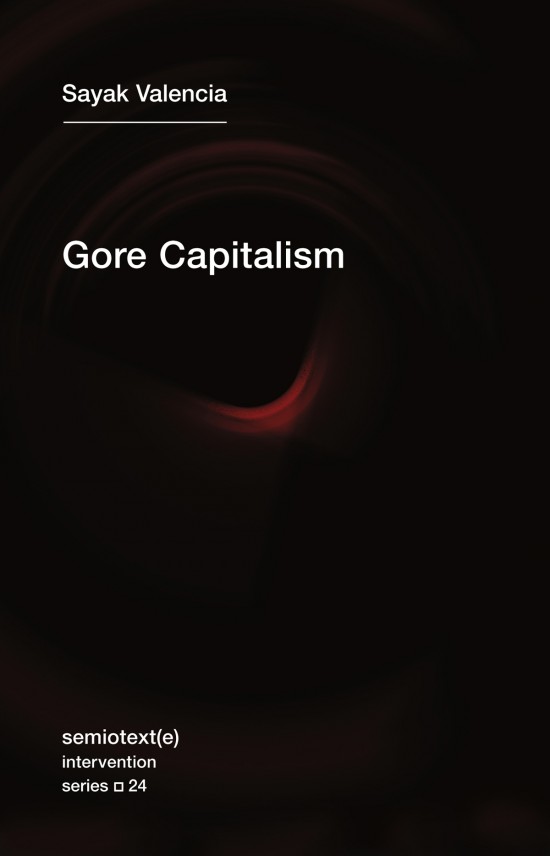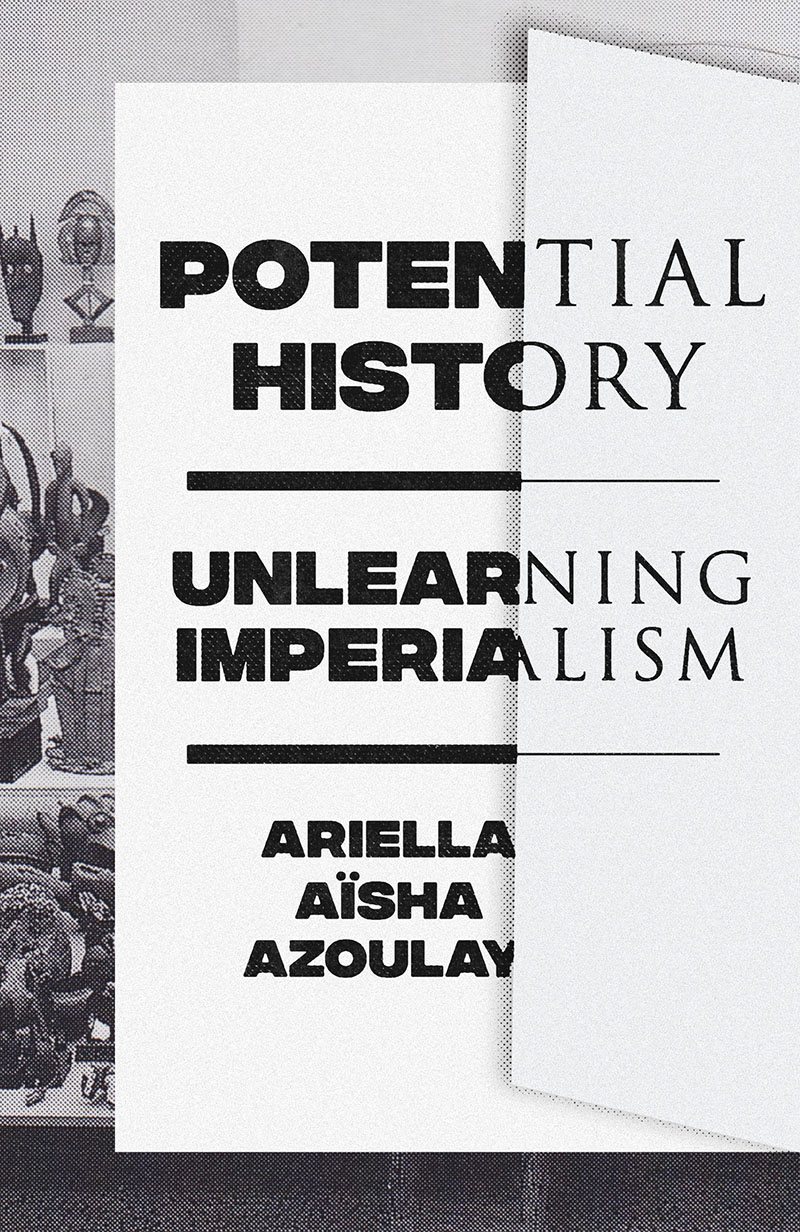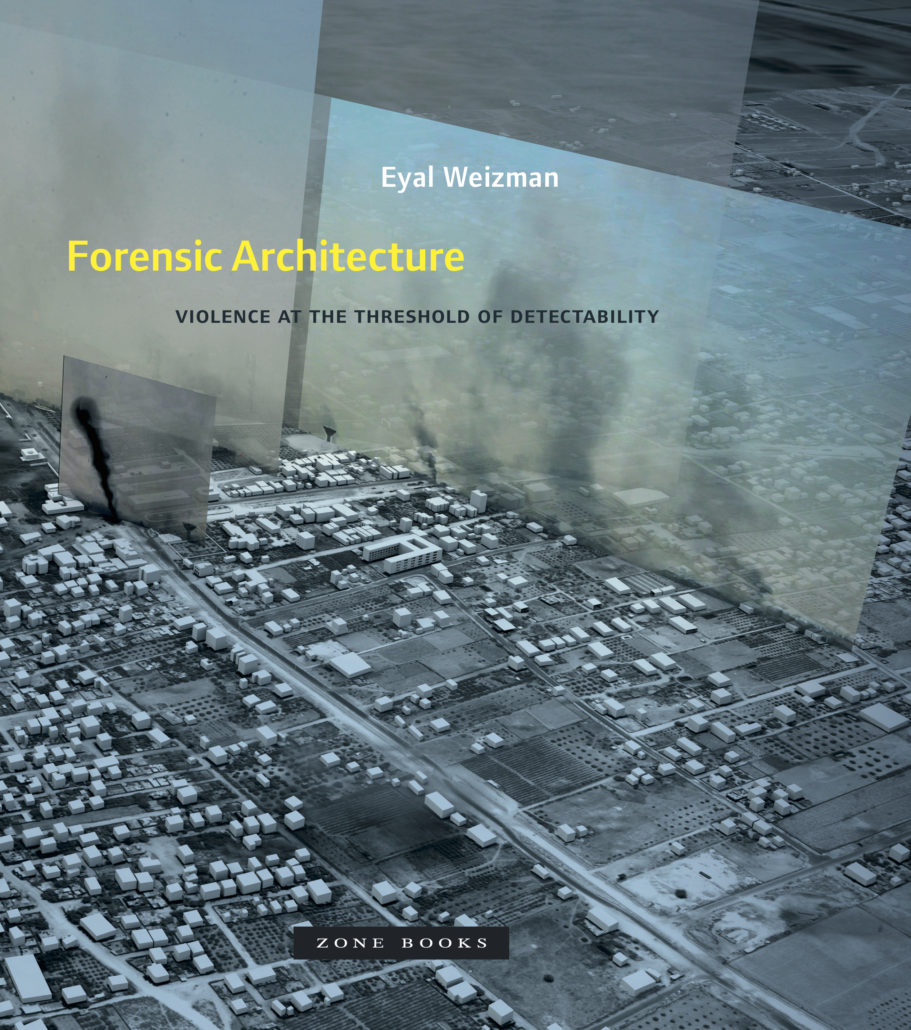Sayak Valencia: Gore Capitalism (2010–) [ES, EN]
Filed under book | Tags: · capitalism, death, feminism, necropolitics, neoliberalism, politics, violence

“Death has become the most profitable business in existence.”—from Gore Capitalism
“Written by the Tijuana activist intellectual Sayak Valencia, Gore Capitalism is a crucial essay that posits a decolonial, feminist philosophical approach to the outbreak of violence in Mexico and, more broadly, across the global regions of the Third World. Valencia argues that violence itself has become a product within hyper-consumerist neoliberal capitalism, and that tortured and mutilated bodies have become commodities to be traded and utilized for profit in an age of impunity and governmental austerity.
In a lucid and transgressive voice, Valencia unravels the workings of the politics of death in the context of contemporary networks of hyper-consumption, the ups and downs of capital markets, drug trafficking, narcopower, and the impunity of the neoliberal state. She looks at the global rise of authoritarian governments, the erosion of civil society, the increasing violence against women, the deterioration of human rights, and the transformation of certain cities and regions into depopulated, ghostly settings for war. She offers a trenchant critique of masculinity and gender constructions in Mexico, linking their misogynist force to the booming trade in violence.
This book is essential reading for anyone seeking to analyze the new landscapes of war. It provides novel categories that allow us to deconstruct what is happening, while proposing vital epistemological tools developed in the convulsive Third World border space of Tijuana.”
Publisher Melusina, Barcelona, 2010
ISBN 8496614875, 9788496614871
240 pages
English edition
Translated by John Pluecker
Publisher Semiotext(e), South Pasadena, CA, 2018
Intervention series
ISBN 9781635900125, 1635900123
330 pages
Reviews: Gabriela Wiener (El País, 2010, ES), Elisa G. McCausland (Profesiones, 2010, ES), Elena Cabrera (DT, 2011, ES), Sergio Gonzalez Rodriguez (Reforma, 2011, ES), Hilda Mariela Barbosa Suarez (Tribuna de Querétaro, 2011, ES), Ignacio Sánchez Prado (ARTMargins, 2018), Richard Marshall (3:AM Magazine, 2018), Rose Deller (LSE Review of Books, 2018), Abeyamí Ortega (Social Text, 2019), Anastasia Baginski (Chasquí, 2019).
Publisher (ES)
Distributor (EN)
Translator (EN)
WorldCat (EN)
Capitalismo gore (Spanish, 2010)
Gore Capitalism (English, 2018)
Ariella Aïsha Azoulay: Potential History: Unlearning Imperialism (2019)
Filed under book | Tags: · archive, art, care, colonialism, commons, history, human rights, imperialism, israel, museum, palestine, photography, politics, sovereignty, strike, theory, violence, world

“A passionately urgent call for all of us to unlearn imperialism and repair the violent world we share
In this theoretical tour-de-force, renowned scholar Ariella Aïsha Azoulay calls on us to recognize the imperial foundations of knowledge and to refuse its strictures and its many violences.
Azoulay argues that the institutions that make our world, from archives and museums to ideas of sovereignty and human rights to history itself, are all dependent on imperial modes of thinking. Imperialism has segmented populations into differentially governed groups, continually emphasized the possibility of progress while it tries to destroy what came before, and voraciously seeks out the new by sealing the past away in dusty archival boxes and the glass vitrines of museums.
By practicing what she calls potential history, Azoulay argues that we can still refuse the original imperial violence that shattered communities, lives, and worlds, from native peoples in the Americas at the moment of conquest to the Congo ruled by Belgium’s brutal King Léopold II, from dispossessed Palestinians in 1948 to displaced refugees in our own day. In Potential History, Azoulay travels alongside historical companions—an old Palestinian man who refused to leave his village in 1948, an anonymous woman in war-ravaged Berlin, looted objects and documents torn from their worlds and now housed in archives and museums—to chart the ways imperialism has sought to order time, space, and politics.
Rather than looking for a new future, Azoulay calls upon us to rewind history and unlearn our imperial rights, to continue to refuse imperial violence by making present what was invented as ‘past’ and making the repair of torn worlds the substance of politics.”
Publisher Verso Books, London, 2019
ISBN 9781788735711, 1788735714
656 pages
Interviews with author: Jadaliyya (2019), Brad Evans (LA Review of Books, 2020), Sabrina Alli (Guernica, 2020).
Reviews: Ian Wallace (Artforum, 2020), Guy Mannes-Abbott (Third Text, 2020), Louis Rogers (review31, 2020), Stephen Sheehi (Hyperallergic, 2020), Luke Urbain (InVisible Culture, 2020), Lunettes Rouges (Le Monde blog, 2020, FR, part 2), Sascha Crasnow (Field, 2022).
Roundtable: Gil Hochberg, Zoé Samudzi, Joshua Simon, Robert Yerachmiel Sniderman (Protocols, 2020).
HTML (added on 2020-2-2)
EPUB (15 MB)
Eyal Weizman: Forensic Architecture: Violence at the Threshold of Detectability (2017)
Filed under book | Tags: · anthropology, architecture, forensics, human rights, israel, law, palestine, politics, violence, war

“In recent years, a little-known research group named Forensic Architecture began using novel research methods to undertake a series of investigations into human rights abuses. Today, the group provides crucial evidence for international courts and works with a wide range of activist groups, NGOs, Amnesty International, and the UN.
Beyond shedding new light on human rights violations and state crimes across the globe, Forensic Architecture has also created a new form of investigative practice that bears its name. The group uses architecture as an optical device to investigate armed conflicts and environmental destruction, as well as to cross-reference a variety of evidence sources, such as new media, remote sensing, material analysis, witness testimony, and crowd-sourcing.
In Forensic Architecture, Eyal Weizman, the group’s founder, provides, for the first time, an in-depth introduction to the history, practice, assumptions, potentials, and double binds of this practice. The book includes an extensive array of images, maps, and detailed documentation that records the intricate work the group has performed.
Included in this volume are case studies that traverse multiple scales and durations, ranging from the analysis of the shrapnel fragments in a room struck by drones in Pakistan, the reconstruction of a contested shooting in the West Bank, the architectural recreation of a secret Syrian detention center from the memory of its survivors, a blow-by-blow account of a day-long battle in Gaza, and an investigation of environmental violence and climate change in the Guatemalan highlands and elsewhere.
Weizman’s Forensic Architecture, stunning and shocking in its critical narrative, powerful images, and daring investigations, presents a new form of public truth, technologically, architecturally, and aesthetically produced. Their practice calls for a transformative politics in which architecture as a field of knowledge and a mode of interpretation exposes and confronts ever-new forms of state violence and secrecy.”
Publisher Zone Books, New York, 2017
ISBN 9781935408864, 1935408860
355 pages
Reviews: Regine Debatty (We Make Money Not Art, 2017), Adam Rothstein (New Scientist, 2017), Sława Harasymowicz (Journal of Visual Culture, 2017), David Huber (Artforum, 2017), Joseph Confavreux (Mediapart, 2017, FR), Felix Bazalgette (New York Review of Books, 2018), Martina Tazzioli (Radical Philosophy, 2018), Noah Chasin (Springerin, 2018), Bernard Hay (Review 31, 2018), Anna Altman (n+1, 2018), Viktoriya Yeretska (BauNetz, 2017, DE), Erick Villagomez (Spacing, 2017), Andreas Petrossiants (Brooklyn Rail, 2018).
PDF (31 MB)
Comment (0)
